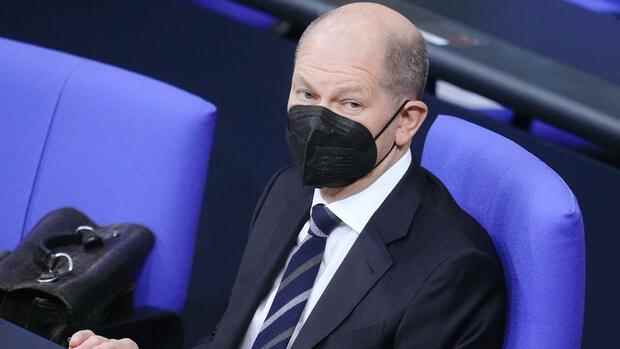In the past few days, the chancellor had been criticized for his reticence in the Ukraine crisis.
(Photo: dpa)
Berlin For the first time since the general election, there have been clear shifts in the Sunday question. According to the ARD “Germany trend” determined by Infratest dimap, Chancellor Olaf Scholz is losing massive approval. The SPD also falls behind.
After 60 percent in the previous month, Scholz currently only convinces 43 percent (minus 17 percentage points) of those entitled to vote, half (51 percent) are critical of the Chancellor’s work.
Scholz had come under international criticism in the past few days, particularly for his reticence in the Ukraine crisis. Only after much hesitation did he put the controversial Nord Stream 2 gas pipeline on the table as a possible sanctions instrument – and only covertly, without naming it.
At the same time, he gave a clear refusal to arms deliveries to Ukraine, which is now being resented by Ukraine and eastern NATO allies. Doubts about the reliability of Germany are also being voiced in the USA.
Top jobs of the day
Find the best jobs now and
be notified by email.
The Chancellor’s silence for days raised the question on social media: “Where is Scholz?” Missing person reports were sent primarily via Twitter and the question was asked: “Has he also forgotten that he is Chancellor?” On Wednesday he then reported an interview on ZDF.
Political scientists give reasons for the slump
The Bremen political scientist Lothar Probst for the survey slump for Scholz back to the fact that the voters initially had high hopes in Scholz’s leadership qualities. “During the election campaign, he seemed more competent and a better leader than his two competitors,” Probst told the Handelsblatt. Now the opposite turns out. “He often disappears and when he talks, he monologues and beats around the bush.” This became particularly clear in relation to the Ukraine crisis.
In the fight against the pandemic, too, many voters would have the impression that the government under Scholz’s leadership is ducking away or avoiding a clear position. The Union, on the other hand, has clarified its leadership question and is in the process of repositioning itself under the new CDU chairman Friedrich Merz and seeking to close ranks with the sister party. “As a result, there is a movement from the center back to Union,” explained Probst.
Where is #OlafScholz ? He will be dearly missed. Here is a photo of his last sighting:
Please send information about his whereabouts to the Chancellery. 🥺🙏#whereIsScholz #Olaf #Scholz #Chancellor pic.twitter.com/gzioPXkXhp
— Herr Dings from Ort (@herr_ort) February 1, 2022
However, not only Scholz is losing ground in the voters’ favour. Most of the other cabinet members surveyed in the “Deutschlandtrend” are also confronted with a significant loss of popularity. 43 percent of those entitled to vote are satisfied with the work of FDP Finance Minister Christian Lindner (minus six percentage points). Green Vice-Chancellor Robert Habeck also lost a lot of support within a month at 39 percent (minus nine percentage points).
In February, Health Minister Karl Lauterbach (SPD) led the list of politicians surveyed by a clear margin (59 percent; minus seven percentage points), but he was also viewed more critically than in January. Behind them is Green Party Minister of Agriculture Cem Özdemir (44 percent).
Baerbock is gaining approval
Green Foreign Minister Annalena Baerbock (36 percent; plus four percentage points) can gain respect. The new CDU chairman Merz, who has now also been confirmed by postal vote, has improved on the previous month (37 percent; plus five percentage points). The left parliamentary group leader Dietmar Bartsch convinced 17 percent (minus one percentage point compared to December), AfD parliamentary group leader Alice Weidel 14 percent (plus two percentage points compared to December).
In addition to Scholz, the SPD is also experiencing a slump in the Sunday issue. If there were a federal election next Sunday, the Social Democrats would get 22 percent – a drop of four percentage points. The Social Democrats are therefore behind the Union for the first time since August last year. Compared to the previous month, this increased by four points to 27 percent.
The Greens remain at 16 percent. The FDP lost one percentage point to ten percent. The AfD gained one point and is now at twelve percent. The Left are unchanged at five percent.
The SPD’s losses in the Sunday question go hand in hand with increased dissatisfaction with the work of the new federal government. Currently, 38 percent (minus eight percentage points) of those surveyed are very satisfied or satisfied with the work of the Berlin coalition; a majority (57 percent, plus 20 percentage points) of German citizens were dissatisfied.
However, the political scientist Probst sees opportunities for the SPD to work its way back out of the polling low. “If it finds a unified and clear position on the Ukraine question and if the omicron wave runs out without causing serious consequential damage, and we get into an endemic state, so that the government can concentrate on its actual core activity along the lines of the coalition agreement , the SPD can also win again,” he said. “However,” added Probst, “it would be a great blemish for them if, due to their current downward trend in the upcoming state elections in large and important federal states, such as North Rhine-Westphalia, they cannot bring about the already tangible and expected change of government.”
More: Where is Olaf Scholz? After much hesitation, the chancellor tried to flee to the front.
